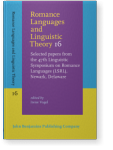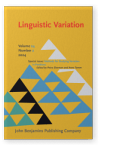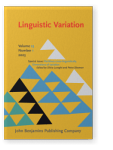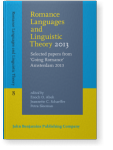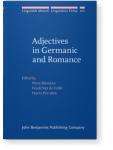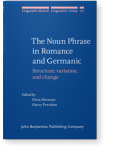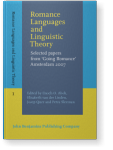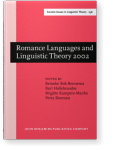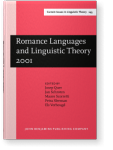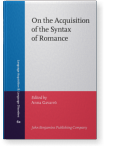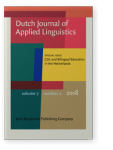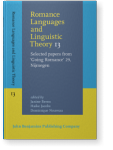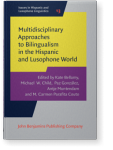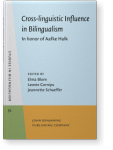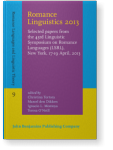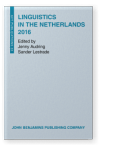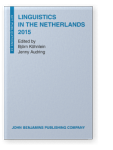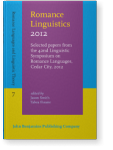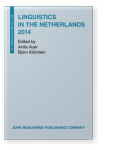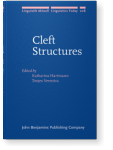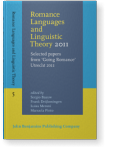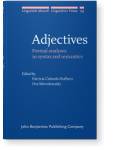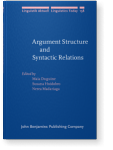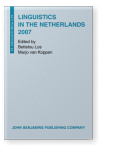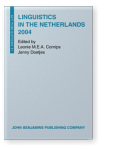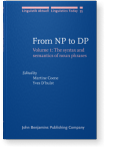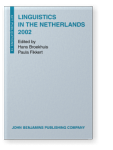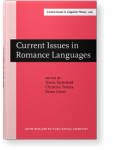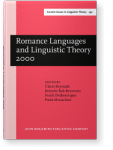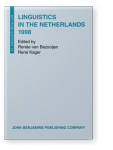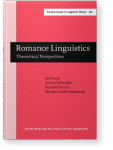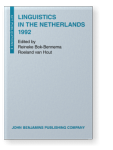Petra Sleeman
List of John Benjamins publications for which Petra Sleeman plays a role.
Book series
Methods for Studying Variation in Partitives
Edited by Petra Sleeman and Anne Tamm
Special issue of Linguistic Variation 24:2 (2024) v, 207 pp.
Partitives cross-linguistically: Dimensions of variation
Edited by Silvia Luraghi and Petra Sleeman
Special issue of Linguistic Variation 23:1 (2023) v, 243 pp.
Subjects Generative linguistics | Typology
Romance Languages and Linguistic Theory 2013: Selected papers from 'Going Romance' Amsterdam 2013
Edited by Enoch O. Aboh, Jeannette Schaeffer and Petra Sleeman
[Romance Languages and Linguistic Theory, 8] 2015. xi, 280 pp.
Subjects Generative linguistics | Romance linguistics | Syntax | Theoretical linguistics
Adjectives in Germanic and Romance
Edited by Petra Sleeman, Freek Van de Velde and Harry Perridon
[Linguistik Aktuell/Linguistics Today, 212] 2014. vii, 286 pp.
Subjects Generative linguistics | Germanic linguistics | Historical linguistics | Morphology | Romance linguistics | Syntax | Theoretical linguistics
The Noun Phrase in Romance and Germanic: Structure, variation, and change
Edited by Petra Sleeman and Harry Perridon
[Linguistik Aktuell/Linguistics Today, 171] 2011. vii, 283 pp.
Subjects Generative linguistics | Germanic linguistics | Historical linguistics | Romance linguistics | Syntax | Theoretical linguistics
Romance Languages and Linguistic Theory: Selected papers from ‘Going Romance’ Amsterdam 2007
Edited by Enoch O. Aboh, Elisabeth van der Linden, Josep Quer and Petra Sleeman
[Romance Languages and Linguistic Theory, 1] 2009. xii, 288 pp.
Subjects Generative linguistics | Romance linguistics | Theoretical linguistics
Romance Languages and Linguistic Theory 2002: Selected papers from ‘Going Romance’, Groningen, 28–30 November 2002
Edited by Reineke Bok-Bennema, Bart Hollebrandse, Brigitte Kampers-Manhe and Petra Sleeman
[Current Issues in Linguistic Theory, 256] 2004. viii, 273 pp.
Subjects Generative linguistics | Romance linguistics | Theoretical linguistics
Romance Languages and Linguistic Theory 2001: Selected papers from 'Going Romance', Amsterdam, 6–8 December 2001
Edited by Josep Quer, Jan Schroten, Mauro Scorretti, Petra Sleeman and Els Verheugd-Daatzelaar
[Current Issues in Linguistic Theory, 245] 2003. viii, 355 pp.
Subjects Generative linguistics | Romance linguistics | Syntax | Theoretical linguistics
2024 Variation in the use of the partitive pronoun ER in regional (Heerlen) standard Dutch Methods for Studying Variation in Partitives, Sleeman, Petra and Anne Tamm (eds.), pp. 262–296 | Article
This paper focuses on the variable use of partitive er in two types of constructions. First, er combined with cardinal numbers like drie ‘three’ and quantifiers like genoeg ‘enough’. Second, er combined with an elliptical noun referring to age and weight. Er should be present in the first case… read more
2024 Methods for studying variation in partitives Methods for Studying Variation in Partitives, Sleeman, Petra and Anne Tamm (eds.), pp. 165–188 | Article
In the last sixty years, starting with the method of introspection to judge the acceptability of linguistic data, research methods in linguistics have become more varied and more sophisticated. This also holds for studies on partitivity. In this paper various methods are presented that have… read more
2023 Partitive pronouns in intransitive contexts in Italian and Dutch Partitives cross-linguistically: Dimensions of variation, Luraghi, Silvia and Petra Sleeman (eds.), pp. 217–243 | Article
In the literature it is often assumed that partitive pronouns can only be used in combination with elliptical objects of transitive or unaccusative verbs. Some counterevidence has been provided as well, however, showing that partitive pronouns may also occur with intransitive verbs. In this… read more
2023 Crosslinguistic variation in partitives: An introduction Partitives cross-linguistically: Dimensions of variation, Luraghi, Silvia and Petra Sleeman (eds.), pp. 1–27 | Review article
2018 Subject position in Spanish as a heritage language in the Netherlands: External and internal interface factors On the Acquisition of the Syntax of Romance, Gavarró, Anna (ed.), pp. 187–214 | Chapter
This study investigates Spanish heritage speakers in the Netherlands concerning their knowledge of three factors influencing subject position in Spanish: verb type, focus and definiteness. The results of a scalar acceptability judgment task show that heritage speakers have monolingual-like… read more
2018 The influence of L2 English on L3 French acquisition in bilingual education CLIL and Bilingual Education in the Netherlands, Mearns, Tessa and Rick de Graaff (eds.), pp. 227–245 | Article
In the present paper, we compare L2 English influence on French third language acquisition (L3A) in first-year and third-year bilingual stream secondary school students and in third-year mainstream secondary school students by means of a gap-filling task. We found that the influence of L2… read more
2018 The role of L2 exposure in L3A: A comparative study between third and fourth year secondary school students in the Netherlands Romance Languages and Linguistic Theory 13: Selected papers from ‘Going Romance’ 29, Nijmegen, Berns, Janine, Haike Jacobs and Dominique Nouveau (eds.), pp. 279–296 | Chapter
In this study, we test the L2 Status Factor hypothesis (Bardel & Falk, 2007, 2012), which claims that the L2 is the preferred background language over the L1 in L3 acquisition (henceforth L3A), and we investigate the effect of L2 English exposure on the role of the L1 and the L2 in L3A. We examine… read more
2017 Chapter 4. Knowledge of mood in internal and external interface contexts in Spanish heritage speakers in the Netherlands Multidisciplinary Approaches to Bilingualism in the Hispanic and Lusophone World, Bellamy, Kate, Michael W. Child, Paz González, Antje Muntendam and M. Carmen Parafita Couto (eds.), pp. 67–94 | Chapter
This study investigates Spanish heritage speakers in the Netherlands on their judgments of Spanish mood in a syntactic context and in two interface contexts: the internal interface between syntax and semantics and the external interface between syntax and pragmatics. The strong version of the… read more
2017 The L2 acquisition of the French quantitative pronoun en by L1 learners of Dutch: Vulnerable domains and cross-linguistic influence Cross-linguistic Influence in Bilingualism: In honor of Aafke Hulk, Blom, Elma, Leonie Cornips and Jeannette Schaeffer (eds.), pp. 303–330 | Chapter
Success or failure in L2 acquisition has been attributed to different factors, such as the linguistic domain involved, (the absence of) instruction or positive or negative transfer. Whereas in most of the literature these factors are studied separately, in this paper we investigate the relative… read more
2016 Gender agreement with animate nouns in French Romance Linguistics 2013: Selected papers from the 43rd Linguistic Symposium on Romance Languages (LSRL), New York, 17-19 April, 2013, Tortora, Christina, Marcel den Dikken, Ignacio L. Montoya and Teresa O'Neill (eds.), pp. 159–176 | Article
Grammatical gender and semantic gender do not always go hand in hand. In French such mismatches can be observed outside the strict DP. To account for such phenomena and for gender more generally, we propose that gender is expressed in two positions within DP: on N as an uninterpretable feature… read more
2016 The influence of L2 English and immersion education on L3 French in the Netherlands Linguistics in the Netherlands 2016, Audring, Jenny and Sander Lestrade (eds.), pp. 152–165 | Article
In this paper, we test the L2 Status Factor (Bardel & Falk, 2007) by examining to what extent Dutch secondary school students (13–15 years) prefer L2 English over L1 Dutch in L3 French acquisition, and we study the influence of L2 education by comparing an English immersion curriculum vs. a… read more
2015 Introduction Romance Languages and Linguistic Theory 2013: Selected papers from 'Going Romance' Amsterdam 2013, Aboh, Enoch O., Jeannette Schaeffer and Petra Sleeman (eds.), pp. vii–xii | Article
2015 Three types of suffixes in French: Discarding the learned / non-learned distinction Linguistics in the Netherlands 2015, Köhnlein, Björn and Jenny Audring (eds.), pp. 33–47 | Article
Traditionally a two-way distinction is made in French between learned and non-learned suffixes, based on etymology. However, this distinction does not account for all suffixes. Furthermore, suffixes are traditionally considered as categorial heads, but some suffixes derive words of multiple… read more
2015 Adjectivization of participles in Romance: A gradual process? Romance Linguistics 2012: Selected papers from the 42nd Linguistic Symposium on Romance Languages (LSRL), Cedar City, Utah, 20-22 April 2012, Smith, Jason and Tabea Ihsane (eds.), pp. 245–260 | Article
The well-known distinction between verbal participles and adjectival ones has been fine-grained in the last decades. Within the adjectival participles, Kratzer (1994) and Embick (2004), for German and English respectively, distinguish between stative and resultative participles. Sleeman (2011)… read more
2014 Gender agreement in interface contexts in the oral production of heritage speakers of Spanish in the Netherlands Linguistics in the Netherlands 2014, Auer, Anita and Björn Köhnlein (eds.), pp. 93–106 | Article
In this paper we present an analysis of Spanish heritage speakers’ oral production of gender agreement outside the DP as an innovative source of support for the Interface Hypothesis (Sorace & Filiaci 2006). We demonstrate that, besides commonly known factors such as the gender, animacy and… read more
2014 From participle to adjective in Germanic and Romance Adjectives in Germanic and Romance, Sleeman, Petra, Freek Van de Velde and Harry Perridon (eds.), pp. 171–198 | Article
Being mixed categories, participles can be fully verbal, fully adjectival, but they can also have a mixed interpretation, viz. as resultatives, which are considered to be a second adjectival type, one that is the result of an event. Parallel to the two types of adjectival participles and the… read more
2014 The adjective in Germanic and Romance: Development, differences and similarities Adjectives in Germanic and Romance, Sleeman, Petra, Freek Van de Velde and Harry Perridon (eds.), pp. 1–32 | Article
In this introductory chapter the similarities and differences in the development and the current behavior of the adjective in Germanic and Romance, both within and between the language families, are discussed. A deeper analysis suggests that what seem to be differences may in fact be similarities… read more
2013 Italian clefts and the licensing of infinitival subject relatives Cleft Structures, Hartmann, Katharina and Tonjes Veenstra (eds.), pp. 319–342 | Article
This paper investigates the licensing of infinitival subject relative clauses by clefted constituents. It is claimed that in Italian clefted constituents license infinitival subject relatives because in this language clefts function as contrastive foci. This claim is supported by the syntactic… read more
2013 L1 acquisition of noun ellipsis in French and in Dutch: Consequences for linguistic theory Romance Languages and Linguistic Theory 2011: Selected papers from 'Going Romance' Utrecht 2011, Baauw, Sergio, Frank Drijkoningen, Luisa Meroni and Manuela Pinto (eds.), pp. 249–266 | Article
In the literature several theoretical analyses of nominal ellipsis of various languages have been proposed. In this exploratory and comparative study the L1 French and Dutch acquisition of noun ellipsis is analyzed. The L1 data suggest that a theoretical analysis of the licensing mechanisms of… read more
2011 The noun phrase in Germanic and Romance: Common developments and differences The Noun Phrase in Romance and Germanic: Structure, variation, and change, Sleeman, Petra and Harry Perridon (eds.), pp. 1–22 | Article
In this introductory chapter some of the main (dis)similarities in DP-syntax between the Germanic and Romance languages, as well as between the individual languages of each group, are explored. We take a look at the following subjects: (a) the ways in which the various languages express… read more
2010 Superlative adjectives and the licensing of non-modal infinitival subject relatives Adjectives: Formal analyses in syntax and semantics, Cabredo Hofherr, Patricia and Ora Matushansky (eds.), pp. 233–264 | Article
The present contribution proposes an analysis of adjectives that license nonmodal infinitival relative clauses. I propose to reduce the uniqueness constraint on the noun phrase modified by non-modal infinitival relatives to licensing by a contrastive identificational focus. The contrastive… read more
2010 Nominalization, event, aspect and argument structure: A syntactic approach Argument Structure and Syntactic Relations: A cross-linguistic perspective, Duguine, Maia, Susana Huidobro and Nerea Madariaga (eds.), pp. 113–130 | Chapter
In this paper we argue that for nominalizations the distinction between process nouns, i.e. complex event nominals, and result/object nouns made by, among others, Grimshaw (1990) and Alexiadou (2001), is too strict. We propose instead a dichotomy that is based on agentivity. We claim that both… read more
2007 Clitic Dislocation: Evidence for a low Topic position Linguistics in the Netherlands 2007, Los, Bettelou and Marjo van Koppen (eds.), pp. 173–186 | Article
2004 The acquisition of definiteness distinctions by L2 learners of French Linguistics in the Netherlands 2004, Cornips, Leonie and Jenny Doetjes (eds.), pp. 158–168 | Article
2003 4. Subnominal empty categories as subordinate topics From NP to DP: Volume 1: The syntax and semantics of noun phrases, Coene, Martine and Yves D’hulst (eds.), pp. 119–137 | Chapter
2002 N-ellipsis in Spanish Linguistics in the Netherlands 2002, Broekhuis, Hans and Paula Fikkert (eds.), pp. 107–116 | Article
2002 Adjectival agreement within DP without feature movement Current Issues in Romance Languages: Selected papers from the 29th Linguistic Symposium on Romance Languages (LSRL), Ann Arbor, 8–11 April 1999, Satterfield, Teresa, Christina Tortora and Diana Cresti (eds.), pp. 301–316 | Article
2002 Partitive constructions and antisymmetry Romance Languages and Linguistic Theory 2000: Selected papers from ‘Going Romance’ 2000, Utrecht, 30 November–2 December, Beyssade, Claire, Reineke Bok-Bennema, Frank Drijkoningen and Paola Monachesi (eds.), pp. 271–286 | Article
1998 How Reduced are Reduced Relatives? Linguistics in the Netherlands 1998, Bezooijen, Renée van and René Kager (eds.), pp. 187–199 | Article
1998 Licensing DP-Internal Predication Romance Linguistics: Theoretical Perspectives, Schwegler, Armin, Bernard Tranel and Myriam Uribe-Etxebarria (eds.), pp. 271–282 | Article
1992 Extraction out of DP in French and proper head government Linguistics in the Netherlands 1992, Bok-Bennema, Reineke and Roeland van Hout (eds.), pp. 235–246 | Article
